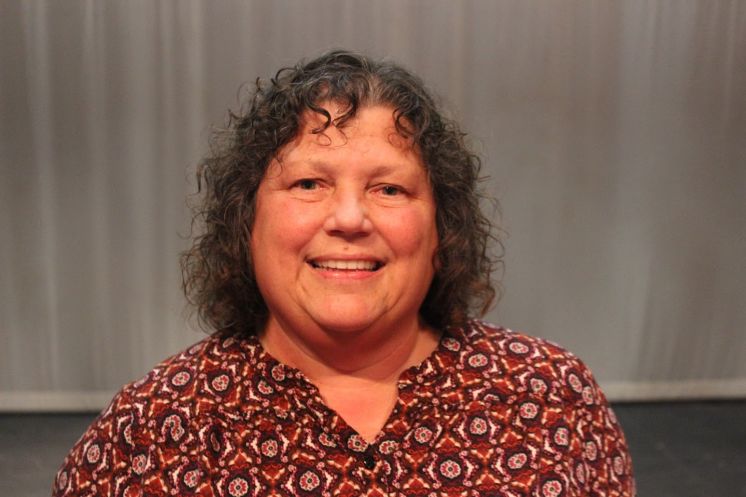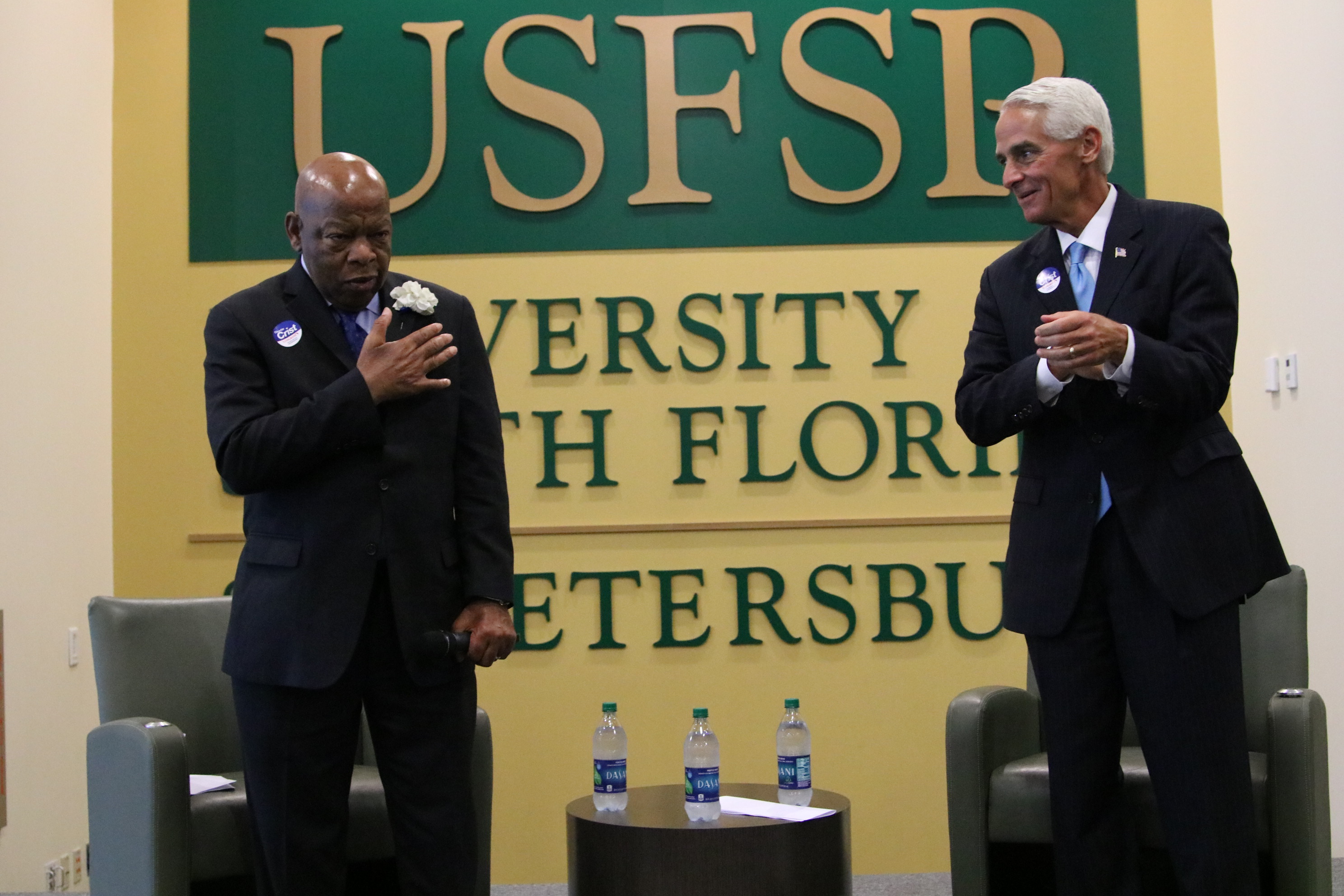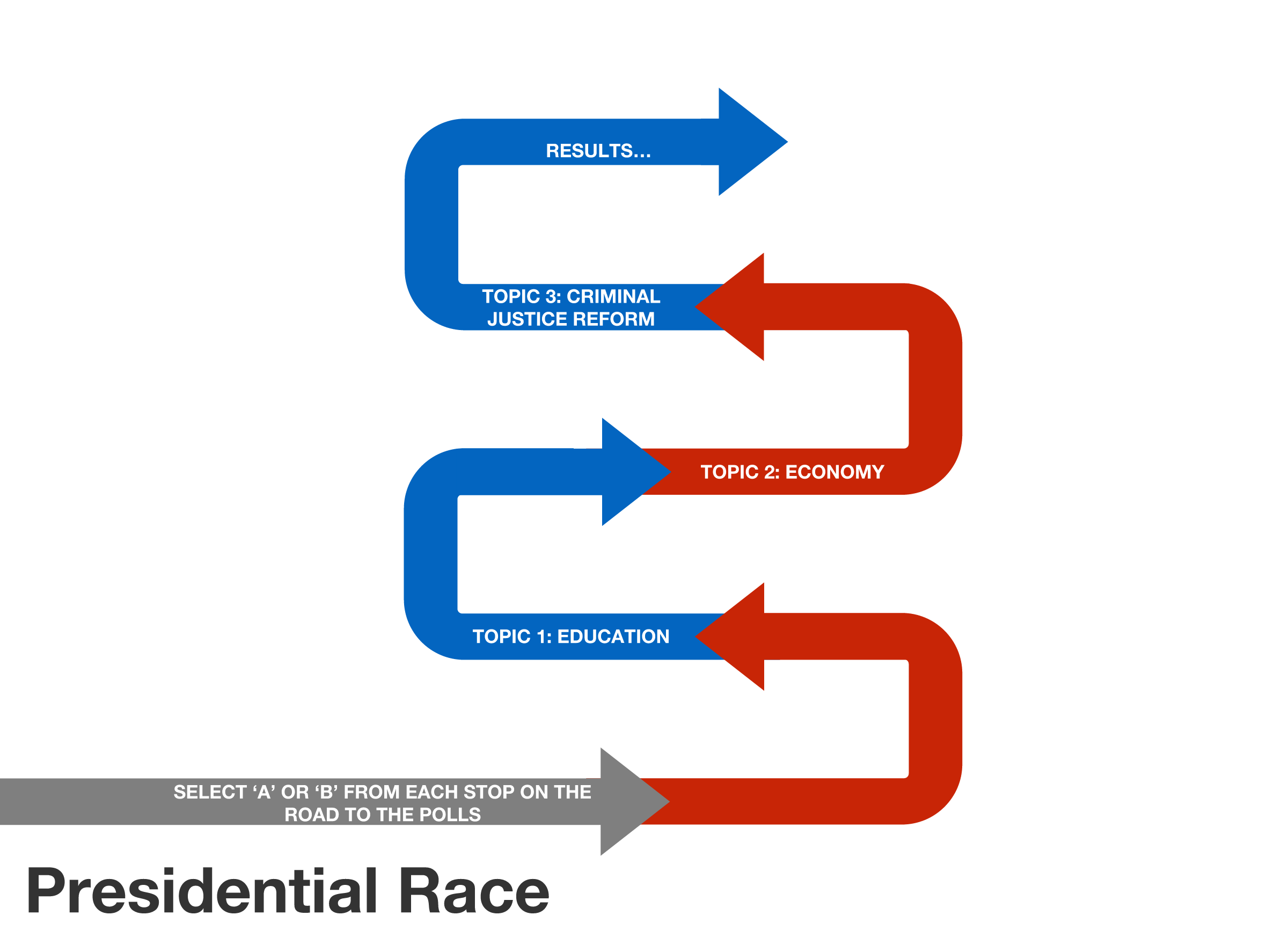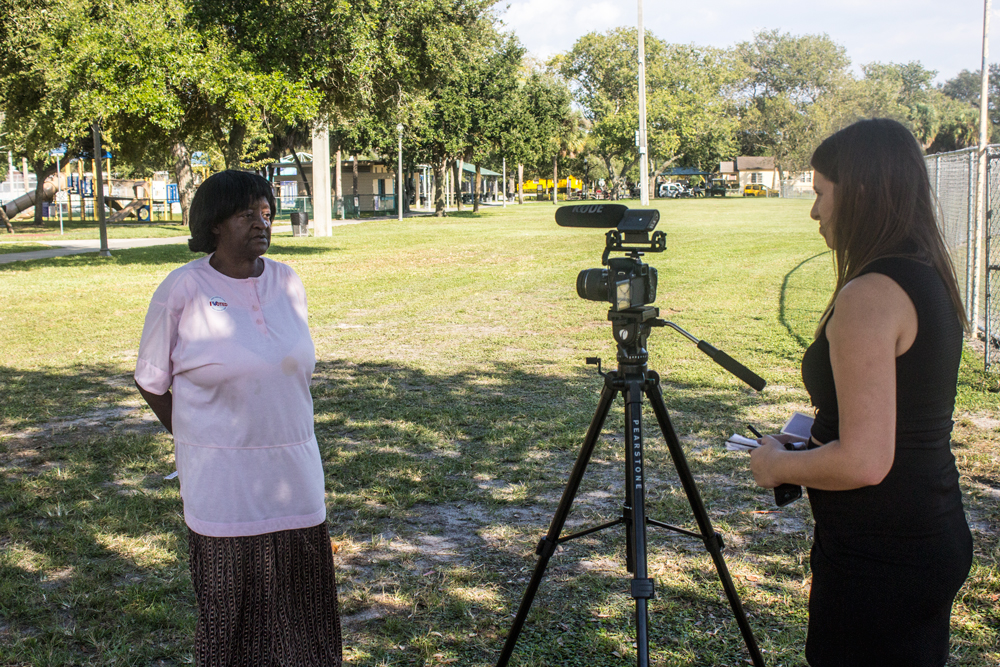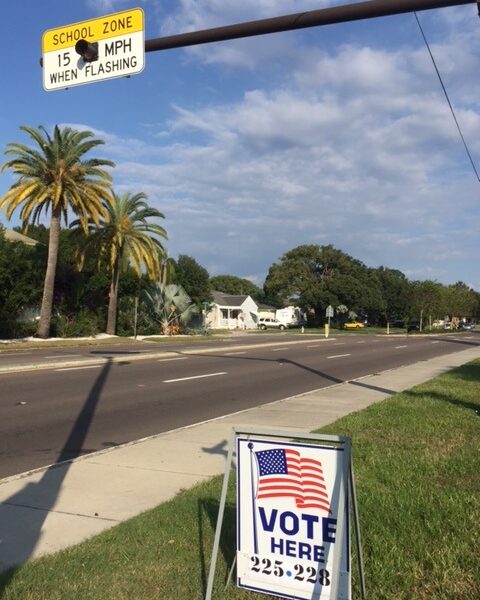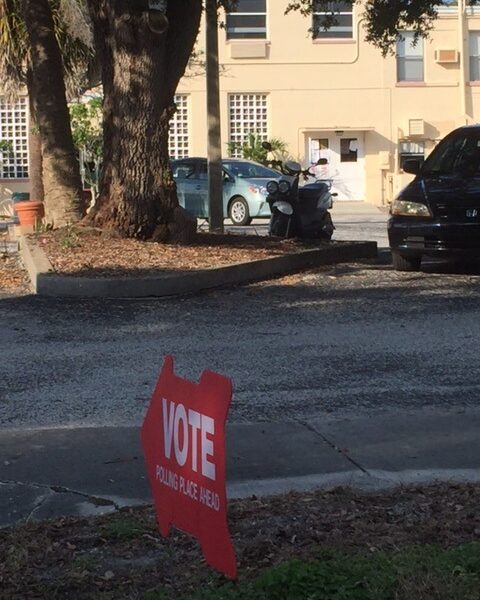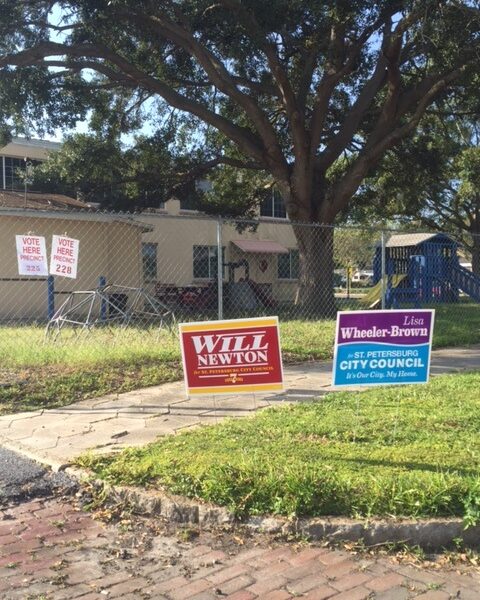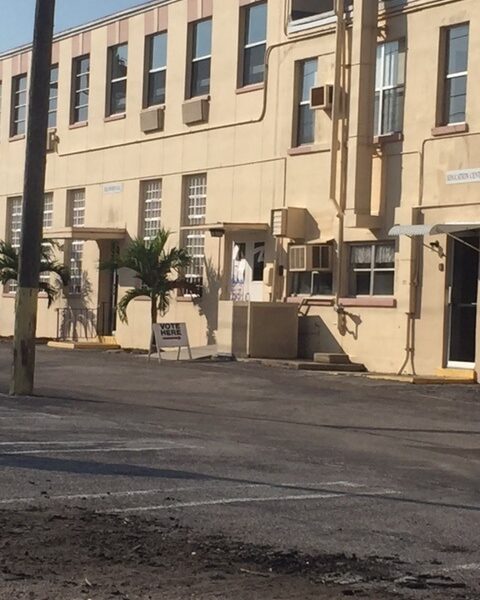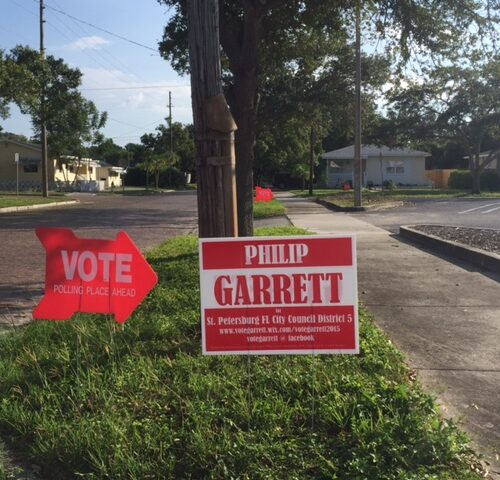Each slide represents a different political race that will be on the ballot. Follow the flow chart through each ‘Topic’ section. Tally up the stances you agree with (Candidate A or Candidate B). Once you reach ‘Results’, see whether you had ‘Mostly A’s’ or ‘Mostly B’s’ and discover which candidate you match with.
BY MOLLY CURLS
Neighborhood News Bureau
ST. PETERSBURG — As the unprecedented presidential election takes the nation by storm, coverage of local politics is suffering.
On Tuesday’s ballot, several races will have profound and immediate effects on St. Petersburg’s Midtown community. This year, Republican incumbent Marco Rubio, who fell out of favor with Florida in the presidential primary, is running against Democratic candidate Patrick Murphy for the U.S. Senate. Incumbent Rep. David Jolly and former Florida Governor Charlie Crist are battling for Florida’s 13th Congressional District. At the local level, Democratic candidate Darryl Rouson and Republican John Houman are campaigning for Florida’s District 19.
Based on a series of interviews with community members, candidates and information on local forums and events, the Neighborhood News Bureau condensed the most discussed issues into three categories: education, the high cost of living, and reform in law enforcement.
Education
The right to a fair and unprejudiced education is not the reality for many children in Midtown, according to community members. Parents are concerned with the disappointing experiences in their children’s education and poor curriculum standards.
“How do we have a say in what is taught in our children’s schools?” Tonya Givens, an audience member at Midtown by Midtown, a discussion forum hosted by the Neighborhood News Bureau, described a disturbingly misleading narrative that has been introduced to her daughter at Campbell Park Elementary. “My daughter came home and was taught that Africans came to America as migrant workers.”
Among the candidates for the U.S. Senate, Rubio has voiced his support of education reform several times in the past, saying that education should be handled at a local level and “if a parent is unhappy with what their child is being taught in school, they can go to that local school board or their state legislature, or their governor and get it changed”.
His opponent, Murphy, who did not respond to emails or calls requesting an interview, states on his campaign website that schools should have “additional support and services” from the government.
Watson L. Haynes, President and CEO of the Pinellas County Urban League, said “children of trauma” is a key term used when discussing obstacles students face as instability at home prevents successful learning. Parents and children experiencing issues such as drug and alcohol abuse, long-term imprisonment, unaddressed mental health problems, and unemployment in their families may affect the children’s development. Post-Traumatic Stress Disorder, or PTSD, can be detected not just in veterans returning from war but in children who endure one or more of those issues as well.
Jolly discussed the need to create a more accommodating environment for students who find themselves in these sorts of situations.
“Let’s move towards more individualized curriculums, recognizing not every student learns the same way. We can do that in the public school system. For a parent who is trying to save their kid from a failing school, let’s give them choice. Let’s keep our opportunity scholarships in place,” he said at a civic forum held at the Rock of Jesus Missionary Baptist Church on Oct. 13
“Every student is different; every community is different. The responsibility of government is to make sure that the resources are available in the communities that need them most.”
Crist echoes this sentiment and believes the answer lies in investigating failing schools in the area and investing in those schools, providing equal funds to every school in the district.
During the forum at the Rock of Jesus Missionary Baptist Church, Rouson spoke about a situation he found himself in, where he visited a local school and found a young girl in time-out because she “couldn’t think [that] day.” Her mother had been arrested for drugs the night before. “Education must become more creative… more responsive,” he said.
Maria Scruggs, President of the NAACP’s St. Petersburg branch, says that she constantly speaks on behalf of the importance behind quality early childhood education.
“The research clearly supports that when children receive a quality early childhood education, the better prepared they are to enter a public school. Many times it’s too late by the time they’re in first grade,” said Scruggs.
Rouson supports parent involvement and small class sizes, as well as fully funded education from the state. This includes early childhood education programs. In his statements on policy reform, he claims to fight for at-risk children by working with the legislature to increase funding for pre-kindergarten and full-day kindergarten programs for jeopardized children.
Houman’s stance on education remains vague. “Education is the backbone of our society. State and local communities have to work together to improve our educational system,” he said during a phone interview. He has primarily emphasized specialized and higher education, with not much mention of the early fundamental education Midtown is lacking. He supports implementing training grants in manufacturing, healthcare services, IT, and agriculture.
Police Reform
There has been established discomfort surrounding local law enforcement in the area, reflective of the same sentiments felt nationwide. The community has continued to demand amendments and reform throughout the police department.
The main concerns raised by the community are advanced police training to properly handle situations involving citizens with mental health issues; restorations of rights, and accelerating the process of released convicts of non-violent crimes; the cessation of racial profiling; fostering good community relations between police officers and residents; ending private prisons.
When asked about the state of relationships between local law enforcement and the community, Ashley Green, Labor Organizer at SEIU-FL and Movement Organizer with Dream Defenders, said, “The answer is no. The [current] policies do not foster good relationships with the community.”
The U.S. Senate race between Marco Rubio and Patrick Murphy has heated up on the topic of police reform. Their stances vary in multiple degrees.
Republican incumbent Rubio does not support the legalization of drugs in any capacity, and claims that doing so would be a “great mistake.” He also does not encourage the reduction of prison sentences for drug charges and discourages leniency in such situations. Rubio explicitly does not call for the end of privatized prisons.
Brother John Muhammad, president of the Childs Park Neighborhood Association, joined Scruggs and Haynes in the discussion surrounding Midtown and spoke to the current conflict surrounding privatized prisons.
“We have a whole generation of black people that are in prison for minimum mandatory sentences for petty drug crimes,” he said.
Democratic candidate Murphy calls for the automatic restoration of rights for nonviolent ex-felons. He claims to support reintegrating those who have responsibly served their time back into society. This support includes banning barriers on employment applications and credit checks to expand job opportunities to released nonviolent offenders.
Murphy authored the Tracking Reputations Upgrades Societal Trust (TRUST) Act to increase cooperation between police and the communities they serve by measuring community trust in the local police force.
High Cost of Living
The high cost of living in Midtown shows it’s face on many streets on the south side of St. Petersburg. Many can no longer afford increasing rent prices due to gentrification of the community. Access to jobs, healthcare, food sources, and housing have become increasingly difficult in the midst of the community renovations.
One of the largest Community Redevelopment Areas, or CRA’s, in the state of Florida, is sitting on the south side of St. Petersburg, beginning at its approval in 2015. Occupying 4,700 acres of land, including Greater Childs Park, more than twenty neighborhood and business associations, and most of Midtown, the CRA has been highly contested by residents.
CRA’s goals are typically associated with redevelopment of urban areas to promote new business and additional housing projects, various opportunities, and commercial revitalization,
The problem, according to Akile Anai, an audience member at Midtown by Midtown, is “the gentrification and building of Midtown is pushing out the African American community.”
These claims stem from accounts of housing and rental prices being raised as the CRA further develops in the community. Gentrification is the process by which middle and upper-class people take up residence in a traditionally working-class area of a city, changing the character of the city.
“The CRA is a development tool to suppress community,” said Scruggs, describing the lack of coordinated or strategic focus of how one single plan supports the work of the bigger picture: developing Midtown.
Rouson has said in his campaign strategies that he believes small businesses are the real engine of a community. His plan to grow small businesses into flourishing marketplaces includes providing incentives for creating new, good jobs.
“It is so difficult and so challenging [for small businesses to get a loan.]” Crist testifies to the hardship the Midtown community faces in the midst of attempting to produce small businesses and expand local job opportunities. Aside from the CRA, he believes there are alternate solutions.
“I believe that there are things that Washington can do, to free some of that capital up. And from what I hear, here in St. Petersburg, it needs to happen to get more minority owners.”
Republican opponent Jolly does not advocate for an arbitrary hike of minimum wage but believes that a gradual index in doing so is safer for jobs in the long-term.
“We need to index it [the minimum wage], create wage growth, but also protect jobs. [And] figure out in a bipartisan way how we do that.”
To find local sites visit votepinellas.com for more information. Polls are open 7:00 A.M. to 7:00 P.M. on Tuesday, Nov. 8.
